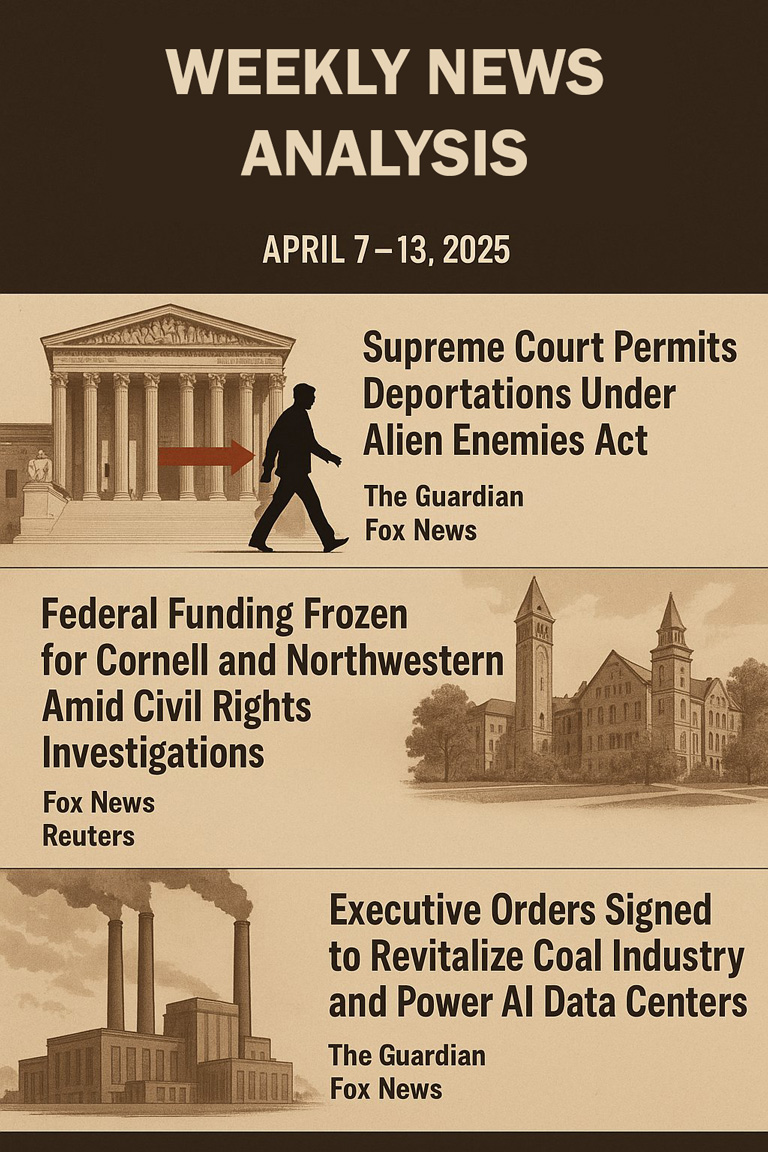
The common thread? Control. Whether through legal doctrine, financial pressure, or executive order, the power centers of the U.S. government sharpened their tools and drew their lines. Let’s dig into the three biggest developments.
Supreme Court Greenlights Deportations Under Alien Enemies Act
Trump is already skirting due process. Now he’s musing about deporting citizens – The Guardian
Supreme Court grants Trump request to lift stay halting Venezuelan deportations – Fox News
The U.S. Supreme Court's 5–4 decision on April 7, allowing the Trump administration to resume deportations of Venezuelan nationals under the Alien Enemies Act, a statute from 1798, is a significant development. The ruling also mandates that all legal challenges to such deportations must be filed in Texas, a jurisdiction increasingly aligned with executive immigration enforcement.
This decision marks one of the rare modern uses of the Alien Enemies Act, historically invoked only in times of declared war. However, under the Court's current interpretation, the 18th-century law is now being used to justify swift and often opaque deportations, with critics warning of constitutional shortcuts and the potential for indefinite detentions.
Left-leaning media outlets like The Guardian have highlighted troubling reports: detainees being held without due process and, in some cases, deported directly into foreign prison systems. Immigrant rights advocates are sounding alarms about the erosion of legal protections for asylum seekers and lawful residents.
On the right, Fox News called the ruling a “temporary but important victory” for the Trump administration's efforts to enforce immigration law. After years of judicial pushback on border policies, the outlet framed the decision as a step toward reasserting executive authority.
However, critics see something far more dangerous: a precedent that grants the federal government near-unchecked power to label individuals as “enemy aliens,” removing them from U.S. soil without trial or appeal. This potential danger should raise concerns and keep us vigilant about the implications of such a ruling. Welcome to the new Age of Tyranny…
Federal Funding Frozen for Cornell and Northwestern Amid Civil Rights Investigations
U.S. freezes funding for Cornell, Northwestern University in latest crackdown - Reuters
In a significant escalation of its campaign against perceived antisemitism on college campuses, the Trump administration has frozen over $1 billion in federal funding to Cornell University and $790 million to Northwestern University. This action is part of a broader crackdown on universities that the administration accuses of tolerating antisemitic discrimination, particularly in the wake of pro-Palestinian campus protests.
The funding freeze —affecting grants and contracts from agencies, including the Departments of Agriculture, Defense, Education, and Health and Human Services— has disrupted significant research efforts and ignited a fierce debate over academic freedom. Critics warn that the government is leveraging financial power to suppress dissent and stifle free speech on campus, turning civil rights enforcement into a political weapon. Supporters, however, argue the action is a necessary step to hold institutions accountable for failing to protect Jewish students amid growing concerns over antisemitism.
This development follows similar actions against other institutions, including a $400 million funding freeze for Columbia University and a review of $9 billion in federal contracts and grants awarded to Harvard University. The administration has also targeted universities on other cultural issues, such as diversity, equity, inclusion programs, and transgender policies.
As the situation unfolds, universities grapple with the immediate financial implications and the broader impact on academic autonomy and freedom of expression.
Trump Signs Executive Orders to Revive Coal and Power AI Growth
Trump signs orders to allow coal-fired power plants to remain open - The Guardian
Coal towns see hope for comeback as Trump ends 'war' - Fox News
On April 8, President Trump signed executive orders to revive the coal industry, granting broad exemptions from EPA regulations and extending the lifespan of aging power plants for the next two years. The policy is framed as necessary to meet growing power demands —particularly from AI data centers, which now require vast amounts of electricity.
One of the orders allows expedited coal leases on federal lands, bypassing previously mandated environmental reviews. Another grants regulatory relief to older coal-fired power plants, many of which were slated for retirement due to their emissions and maintenance costs.
The Guardian characterized the orders as a deliberate rollback of hard-fought environmental gains, suggesting they prioritize short-term energy output over long-term climate responsibility. Environmental groups condemned the orders, predicting increased pollution and higher rates of respiratory illness near industrial corridors.
By contrast, Fox News showcased interviews with former coal miners and plant operators expressing gratitude for what they see as a second chance —both for their livelihoods and their towns. For them, AI’s exponential demand for energy is not a problem to solve but a lifeline to grasp.
Still, the policy move raises more profound questions. Is the administration tying America’s technological future to this energy source? Can AI be powered ethically in a world strained by energy inequities and environmental degradation?
This isn’t just about energy —it’s about priorities. And this week, the message is clear: energy security comes first, even if it comes from the past.
The Machine Speaks Louder Now
What ties this week’s stories together isn’t just timing —it’s technique. Law, money, and machinery were each used as tools of force, not negotiation. The Supreme Court’s ruling revived a 200-year-old statute to target vulnerable populations with minimal oversight. The freezing of university funds weaponized bureaucracy to redraw ideological boundaries. The executive orders on coal highlighted how political leadership can revive sidelined industries to meet modern infrastructure and energy demands—especially in the age of expanding AI and data center growth.
In every instance, norms were tested. Lines were crossed.
Whether the subject was immigration, academic freedom, or energy policy, the theme remained clear: systems are being restructured in real-time —with little debate and even less transparency. All of this is justified under the same banner: national interest.
This wasn’t just a turning point. It was a message from the court, the executive desk, and the federal purse alike. Each decision signals that the levers of American power are no longer constrained by tradition, consensus, or even legal precedent.
They are being pulled with greater intensity and reach —reshaping the future in ways that demand scrutiny.
Stay tuned. The next week in the machine is already turning.
For a quick recap, listen to this week's news in verse!


